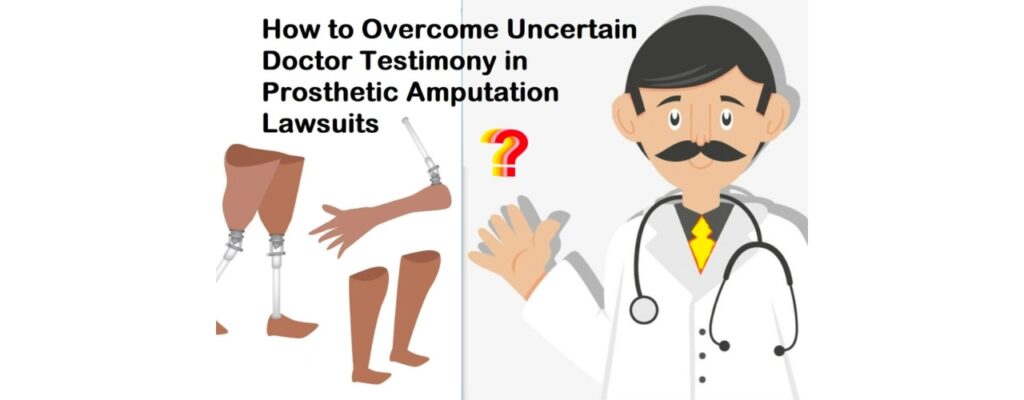Amputation cases, especially where a prosthetic is needed, present unique legal problems. The amputee may presume the cost of future medical treatment is a certainty. This is far from the truth. A number of problems may rob the accident victim of their ability to pay for future prosthetic costs and other medical treatment. This article teaches ways to overcome medical physician testimony problems.
Treating physicians often tell an amputee victims that the accident was certainly the cause of their injury. The Doctors will say they will “back them up” with whatever help they may need. Once the lawsuit starts, and insurance companies ask questions, the doctors retreat. Their testimony can even be harmful. The primary method is the doctor appearing to support the patient; but in reality the Doctor’s testimony harms their patient’s legal needs.
Physician Failure to Understand the Legal Standard
The problem is the standard to get testimony into evidence in court. Courts have requirements called “foundation.” A witness may “say” something; but if what the witness says does not have a foundation, the jury or judge will not consider (or even hear) it.
Mixing “Certainty” up with “Reasonable Medical Certainty”

With physicians, this is the “reasonable medical certainty” standard. For example, in Missouri, the Supreme Court ordered in cases like Swartz v. Gail Webb Transportation Corporation, 215 S.W. 3d 127, 130 (Mo. banc 2007), admissible evidence must be “to a reasonable degree of medical certainty.” This means it must be “more likely than not” or greater than 50% likely.
Herein lies the problem. Physicians will quaff that they cannot say with absolute certainty or cannot be accurate in predicting what a patient will suffer or need in the future and therefore cannot say with certainty. This will mean their testimony does not get into evidence and the amputee victim loses.
Dr. Jonas Rappeport, MD, wrote a lengthy article about physician uncertainty and legal testimony in 1985. Reasonable Medical Certainty, Bull. Am. Acad. of Psychiatric Law, Vol. 13, No. 1, 1985. In that article, Dr. Rappeport called the American legal standard a “legal fiction” and void of any practical meaning for physicians. In essence, if a doctor cannot meet this legal standard, he is saying nothing at all.
Passive Qualifying Words
A second problem is physicians that give opinions, saying words like “might,” or “possibly,” or “could.” Again, these are not opinions to “a reasonable degree of medical certainty” and may be excluded by a trial judge. A Missouri court as early as 1965 addressed this.
The Court in Bertram, v. Wunning, 385 S.W. 2d 803 (Mo. App. 1965) considered the standard. Herein, the court indicated that expressions like could, might, or possibly are common instances of language used by experts in the field. The court recognized that as long as the physician indicates his opinions are to a reasonable degree of medical certainty, even though the physician may use qualifying language, the testimony is admissible. Thus, the first problem with physician uncertainty is overcome.
The Uncertain Future of the Patient

A second problem is the uncertainty of future medical treatment or repercussions. Doctors helping amputation victims cannot see the future. Future treatment or negative outcomes may be dependent upon events that do not occur. This second problem is physicians saying this may not occur unless one or two or three other events happen. Therefore, they give the opinion they cannot say to a reasonable degree of certainty because they do not know the certainty of these future events. This challenge can also be overcome.
Events that May Only Occur if Something Else Happens

The Missouri Supreme Court in the case of Bynote v. National Supermarkets, Incorporated, 891 S.W. 2d 117, 124-25 (Mo. banc 1995) addressed this issue. The court ruled that evidence of future treatments and even its costs may be admitted before a trial court or jury. The evidence can “come in” even when the medical treatment would be dependent upon the outcome of other events, such as more conservative medical treatment.
In Bynote, the court considered a victim that would only need the additional treatment, if they later began suffering a locked back. Surgery was possible but not recommended by the treating physician. Still, it was admissible as a possible future consequence.
The Missouri Supreme Court in the case of Breeding v. Dotson Trailer Repair, 679 S.W. 2d 281, 283 (Mo. banc 1984) considered a case where the patient did not want the surgery. In Breeding, the accident victim testified they did not want surgery. Furthermore, the victim’s physician indicated surgery would only be needed if and only if conservative treatment failed. Still, since surgery was a possibility given future events, it was admitted.
This was later expanded in the case of Emery v. Wal-Mart Stores Incorporated, 976 S.W.2d 439 (Mo. App. 1998).
These are two ways in which uncertain physician testimony can be admitted so that an amputee can receive compensation for future treatment, even when it is uncertain or dependent upon other factors.
Look to other materials on our page for Amputation Lawyers and personal injury claims.



